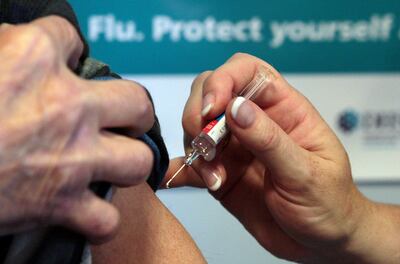Doctors in Britain say people have been increasingly reporting symptoms of a so-called 'super-cold' that has reportedly swept the country.
Health officials have urged people to stay at home and take a coronavirus PCR test if they are experiencing flu or Covid-like symptoms, including a cough, runny nose, loss of smell or heightened temperature.
Experts say the circulating virus is unlikely to be a new stronger strain of the cold, but is instead likely related to weakened immune systems following the coronavirus lockdown.
Immunity to the viruses could have waned during the 18 months of restrictions, so it will be “less effective against colds than would be expected normally”, according to Prof Neil Mabbott, an immunologist at the University of Edinburgh.
“This highlights the power of the lockdown, mask wearing, social distancing and sanitation measures introduced in response to the Covid-19 pandemic.
“Not only was this very effective in reducing transmission of the coronavirus within the community, but at the same time it had the additional benefit of reducing the spread of colds and other common transmissible diseases.
“As these measures are eased and people start mixing more indoors and travelling on public transport et cetera, we can expect to see a significant rise in colds and other respiratory diseases.
“It is unlikely we are seeing the circulation of a ‘super cold’, rather our immune systems have had limited exposure to colds over the past 18 months, so our immunity to these diseases will have waned during this period and will be less effective against colds than would be expected normally.
“Some of the symptoms between colds and Covid-19 can be very similar during the early stages, but of course if people develop a fever, a cough or any of the other Covid-19 symptoms such as loss of taste or smell it is important that they isolate and have a Covid-19 test.
“For most people with a cold, plenty of fluids and paracetamol should help ease the symptoms. Unlike Covid-19, a cold is usually relatively harmless for most people.
“So self-isolating with a cold shouldn’t be necessary but increased hygiene will help to limit spread.”
Alex Richter, professor of clinical immunology at the University of Birmingham, said: “It is impossible to tell the difference between a cold and Covid-19 clinically.
“They present so similarly that only PCR testing can differentiate between the two. Lateral flow testing can help with screening but if someone has symptoms then they should go for a PCR swab test.”

UK launches largest-ever flu vaccine campaign
It comes as the National Health Service continues to push ahead with its biggest-ever flu campaign amid fears that if the viral infection is left unchecked this winter then thousands of lives could be lost.
More than 35 million people in England are eligible for a free vaccination.
The NHS in England said that about 1.25 million texts and 300,000 emails have already been sent to parents of 2 and 3-year-old children urging them to book an appointment for their children to get the flu nasal spray.
And a further 1.3 million letters have been sent out outlining how parents can book the vaccine.
Dr Nikki Kanani, medical director of primary care at NHS England, said: “Every year, we vaccinate more and more staff and patients against flu, but this year it is more vital than ever that all children and eligible adults take up the offer of the free vaccine, as we head into one of the most challenging winters yet for the NHS.”


